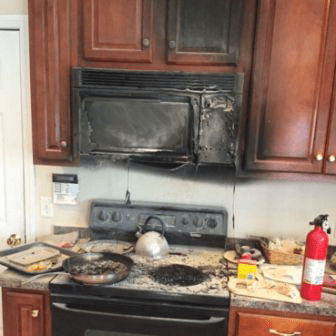Cooking is the number one cause of house fires and yet many homeowners are not prepared for a cooking mishap. Grease fires are especially dangerous if not handled properly. These fires burn very hot and can get out of hand very quickly. Knowing how to prevent them and what action to take if you do have a grease fire can mean the difference between dinner and disaster.
What Causes a Grease Fire?
Grease fires can occur when oil burns too hot or too much oil is used. Different types of oils such as vegetable and olive have different smoking points. For example, sunflower oil and olive oil have low smoking points meaning they require a lower heat setting than other oils. When too much oil is used, you run the risk of the oil splashing out of the pan and onto the heat source.
Preventing Grease Fires
- Begin with a clean workspace and cookware. A dirty, greasy range hood can be fuel for a grease fire.
- Clean up spills. Any oil or food that has fallen into the burner's drip pan could ignite when you go to cook next time.
- Never leave cooking unattended, even if you leave the kitchen for a short while.
- Be aware- if the oil begins to smoke, turn the heat down or off completely and carefully remove the pan from the stove. This is the first sign that the oil is too hot and close to catching fire.
- Add food and ingredients slowly to the pan to avoid splashing the oil onto the burner.
- When draining grease from a pan, make sure to clean any residue that may have dripped down the side of the pan before returning the pan to the stove.
If You Have a Grease Fire 
What to DO:
- Turn off the heat to the stove or the oven.
- Keep a lid handy to gently slide over the pan and smother the flames. Sliding the lid over the flames instead of dropping it from above ensures that the pan does not move and risk splashing hot oil and spreading the flames. Only remove the lid once the pan has fully cooled to avoid the fire re-igniting.
- Pour baking soda on the flames. This method is best used when dealing with small flames since it requires quite a lot of baking soda.
- Use a kitchen fire extinguisher. This method is best used as a last resort since it will spread particles throughout the kitchen.
- If the fire grows out of control- get out of the house, call the fire department, and then ServiceMaster Dynamic Cleaning.
What NOT to do:
- Do not use water to extinguish the flames! Water and oil don't mix. The water will sink to the bottom of the pan, rapidly heat up, and turn to vapor causing an explosion of flaming hot oil.
- Do not attempt to move or carry the pan outside or to the sink. Moving the pan may cause the oil to splash and burn you or your home.
- Do not use flour or another baking product. These items may look similar to baking soda, but the chemical reactions are not the same.
- If the fire is in the oven- do not open the oven door.
- Do not open doors or windows to the kitchen until the fire is completely out. Fire thrives on oxygen.
We hope you never have to deal with the repercussions of a kitchen fire, but if you do, ServiceMaster Dynamic Cleaning is here to help with all your fire damage restoration needs.

